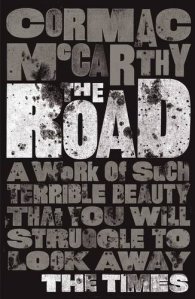In terms of plot, this short novel avoids complication. It is the story of a man and his son, who remain unnamed for the duration of the narrative, as they traipse through a barren, desolate landscape heading along The Road to the east-coast in order to avoid the deathly chill of winter. What has happened to this post-apocalyptic world is never explicitly revealed, but the torrid effects of what seems to be a type of deflagration are laid bare by McCarthy. Firstly there is the monochromatic grey landscape; the land’s produce is torched and withered, completely dead, and the air is polluted by the abundance of ash which clogs the lungs of the Man and leaves him coughing in the cold, dark nights. This heavy murk also covers the sun, a view of which seems to be rare if not impossible. At one point the Boy asks:
“If you were a crow could you fly up high enough to see the sun?
Yes. You could.
I thought so. That would be really neat.
Yes it would. Are you ready?”
The old landscape which, along with the absent sun, once fed and nourished life, is a mythical idea here, and instead the land is destructive and treacherous. The species of life that the Man and the Boy encounter on their journey along the road is suspicious, fearsome and almost unrecognisable. In a world where humanity survives on tinned and powdered goods, man has turned to cannibalism for survival. This forces the novel’s protagonist to take an understandably hostile approach towards strangers, one which is, at times, heart-breaking for the Boy. Throughout the novel, he yearns for human contact, for goodness, for love. But The Road is a world defined by the stoicism and grit of the Man, and a glum acceptance the slight flicker of the flame of love and goodness only remains in this world because of these two characters.
I found McCarthy’s prose to be fantastically simple, highly effective and emotive, but I was a bit stumped by his iconoclastic style. He seems (perhaps like a lot of us) to dislike grammar and his paragraphs are all very fragmented and spaced out across the page. This spacing of the paragraphs, I think, forces the reader to dwell on the sharp poignancy of the language and allows you to really feel the emotional weight of the plot. I wonder whether the collapse of the world as we know it is being mirrored by McCarthy’s prose in The Road, with the absence of particularly hyphens and apostrophes. Nevertheless, stylistically it certainly works and I thought McCarthy’s original and experimental approach to style and grammar was both interesting and refreshing and it is something I would love to see in more contemporary fiction.
Thematically, The Road is extremely rich and is a springboard for discussion on an abundant array of topics. I thought the portrayal of the Boy, a character who has grown up in this post-apocalyptic world, was extremely well done and one of the main strengths of the novel. The attention to detail that McCarthy pays to how a child would psychologically and physically mature in this dystopia pays its dues and gives us a genuinely realistic character who draws out our empathy. This is seen, for example, in the son’s incapacity to imagine the pre-dystopian, seemingly mythical world of green splendour, love and life that his father describes to him through stories. And again when the boy uses expressions and clichés gleaned from his father, “long term goals” and “warm at last” are memorable examples, and his father reacts with a mixture of confusion and pleasure at his son’s development. Glints of humanity such as these are charming, pleasant but also heart-wrenching and depressing when facing the bleak reality of their fate. McCarthy is able to imitate the repetition of routine of their day-to-day life without the novel ever feeling tedious or repetitive. He does this by recounting in meticulous detail the minutiae of their lives, and this style reminds us that although we might have a samey, tedious weekly routine, no day is ever the same and we should not take this for granted, especially in the wake of The Road. Another final point of interest is that the novel contains nearly no woman at all, and the women that do appear just pass by as part of a group. The Man and the Boy do skirt around the subject of the Boy’s mother, but in relatively short time. The absence of women, for me, coincides with the absence of life, love and goodness in this novel. In fact, you could read this novel as a depiction of what would happen if men were in charge of weapons of mass destruction that could realise McCarthy’s dystopia (Hmmm…).
There’s so many more facets to this novel that I have not even touched upon and for this reason I it would be a wonderful novel for a book club to explore or for a student to write about for a dystopian-based essay. If you haven’t read this novel, I urge you to go out and grab it and Pan MacMillan have a wonderfully designed edition (see below) designed by David Pearson that you can pick up online from Foyles here (or in any good local independent bookshop on your high-street!), an edition whose cover is supremely more tasteful that my own!
Thanks for reading, let me know what you thought of The Road and if I have missed any interesting angles.



